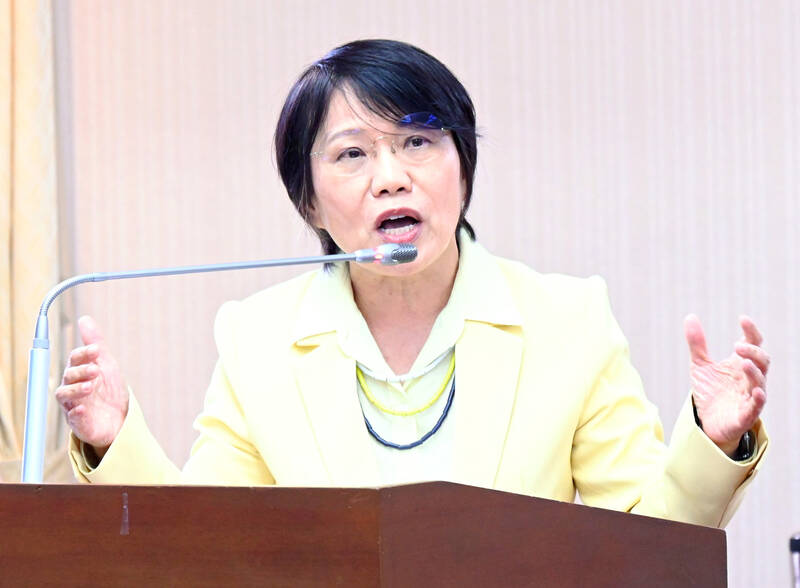Rescinding provisions of the Civil Defense Act (民防法) permitting civilian forces to support military tasks during wartime would cripple national defense, Minister of the Interior Liu Shyh-fang (劉世芳) said on Saturday.
Chinese Nationalist Party (KMT) Legislator Hsu Chiao-hsin (徐巧芯) had proposed draft amendments to the Civil Defense Act (民防法) to exclude military operations support from the scope of civilian defense efforts.
President William Lai’s (賴清德) administration has set a goal of training 400,000 people as part of a civilian defense force to enhance whole-of-society defense resilience.

Photo: Chu Pei-hsiung, Taipei Times
However, opposition parties have questioned whether those people would be conscripted into a “militia.”
The KMT caucus said it would also propose draft amendments to the All-out Defense Mobilization Readiness Act (全民防衛動員準備法) to revoke provisions for the mobilization of “school youths.”
Liu said she was concerned about Hsu’s bill, which was sent back to the legislature’s Procedure Committee on Friday.
The 400,000 people to be trained for a civilian defense force would include about 270,000 people who are active members or reservists in alternative military services, more than 40,000 volunteer firefighters, and more than 70,000 people from civic task forces, such as volunteer police and disaster response groups, she said.
A civilian defense force would assist the government in humanitarian aid and maintaining public order in response to natural disasters or other emergencies, she said, adding that they would not be “recruited,” but would be grouped and trained in line with regulations
The armed forces are among the primary responders to natural disasters, but they could not be mobilized if they are engaged in a war, she said.
The Civil Defense Act was based on Geneva Conventions to establish legal grounds for a resilient society that could deal with extreme situations, Liu said.
“Civilian defense forces would help maintain public order and control traffic, and help with disaster relief, rescue operations and logistics work. They are not armed militias and would not participate in military combat missions,” she said.
Students should develop the ability to identify disasters or crises and how to respond, which have long been incorporated in training on campus safety and earthquake safety, as well as the military training courses in high schools, she said.
“Students are part of the national defense system on campus, and their inclusion [in civilian defense forces] is not new,” she said.
Efforts between civic groups and government agencies at all levels in promoting national resilience should not be stigmatized, she said.
“Would anyone say physical education should be abolished just because a student got hurt and bled during the class?” she said in response to those who exaggerate the risk of civilians providing support to the military.

Taiwan has received more than US$70 million in royalties as of the end of last year from developing the F-16V jet as countries worldwide purchase or upgrade to this popular model, government and military officials said on Saturday. Taiwan funded the development of the F-16V jet and ended up the sole investor as other countries withdrew from the program. Now the F-16V is increasingly popular and countries must pay Taiwan a percentage in royalties when they purchase new F-16V aircraft or upgrade older F-16 models. The next five years are expected to be the peak for these royalties, with Taiwan potentially earning

STAY IN YOUR LANE: As the US and Israel attack Iran, the ministry has warned China not to overstep by including Taiwanese citizens in its evacuation orders The Ministry of Foreign Affairs (MOFA) yesterday rebuked a statement by China’s embassy in Israel that it would evacuate Taiwanese holders of Chinese travel documents from Israel amid the latter’s escalating conflict with Iran. Tensions have risen across the Middle East in the wake of US and Israeli airstrikes on Iran beginning Saturday. China subsequently issued an evacuation notice for its citizens. In a news release, the Chinese embassy in Israel said holders of “Taiwan compatriot permits (台胞證)” issued to Taiwanese nationals by Chinese authorities for travel to China — could register for evacuation to Egypt. In Taipei, the ministry yesterday said Taiwan

‘LIKE-MINDED PARTNER’: Tako van Popta said it would be inappropriate to delay signing the deal with Taiwan because of China, adding he would promote the issue Canadian senators have stressed Taiwan’s importance for international trade and expressed enthusiasm for ensuring the Taiwan-Canada trade cooperation framework agreement is implemented this year. Representative to Canada Harry Tseng (曾厚仁) in an interview with the Central News Agency (CNA) said he was increasingly uneasy about Ottawa’s delays in signing the agreement, especially as Ottawa has warmed toward Beijing. There are “no negotiations left. Not only [is it] initialed, we have three versions of the text ready: English, French and Mandarin,” Tseng said. “That tells you how close we are to the final signature.” Tseng said that he hoped Canadian Prime Minister Mark Carney

POSITIVE DEVELOPMENT: Japan and the US are expected to hold in-depth discussions on Taiwan-related issues during the meeting next month, Japanese sources said The holding of a Japan-US leaders’ meeting ahead of US President Donald Trump’s visit to China is positive news for Taiwan, former Japan-Taiwan Exchange Association representative Hiroyasu Izumi said yesterday. After the Liberal Democratic Party’s landslide victory in Japan’s House of Representatives election, Japanese Prime Minister Sanae Takaichi is scheduled to visit the US next month, where she is to meet with Trump ahead of the US president’s planned visit to China from March 31 to April 2 for a meeting with Chinese President Xi Jinping (習近平). Japan and the US are expected to hold in-depth discussions on Taiwan-related issues during the